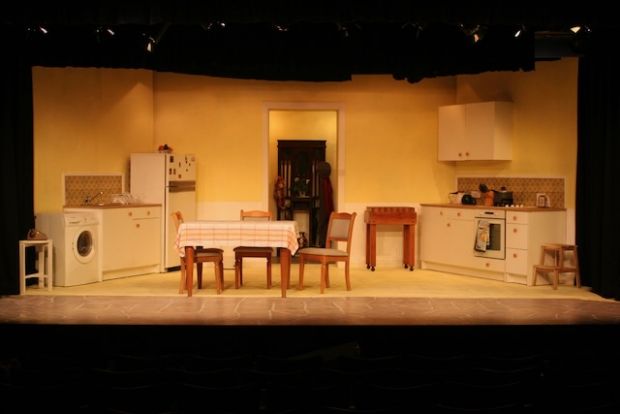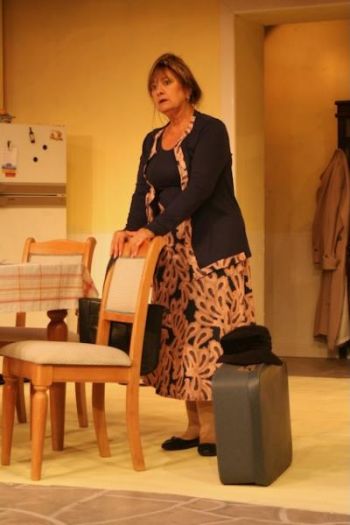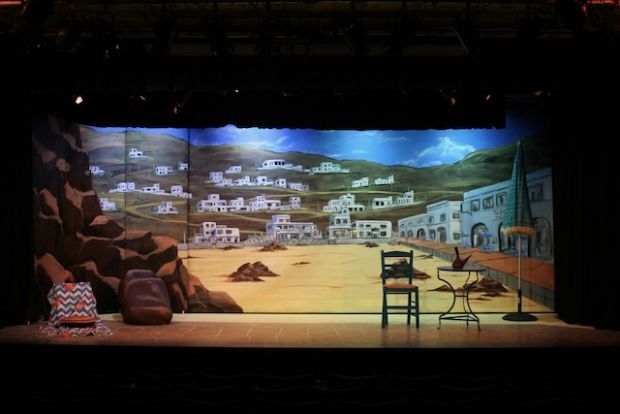Shirley Valentine
Wondering what has happened to her youth and feeling like her family see her as just a servant rather than a wife or mother, Shirley Valentine regularly talks to the wall about her lost opportunities and unhappiness. When a friend of hers invites Shirley to join her on a trip for two to Greece, she leaves a note in the kitchen and flies away for two weeks. There she quickly rediscovers everything she thought was lost and decides to stay on in her Mediterranean paradise.

Theresa (Lilly) Dolman is Shirley, and we’re introduced to her having a conversation with the kitchen wall whilst preparing dinner for her husband, Joe. Then she breaks the fourth wall and directs her thoughts to the audience. Shirley walks around the functional kitchen, knowing where everything is without looking, yet noting what she must tell Joe about the washing machine and the cooker – and don’t get them mixed up! She drinks a glass of wine, she slices a spud, and we’re taken on a breathtaking journey of Shirley and her family from school to chopping board.

Perhaps better known as the Oscar-nominated and BAFTA award-winning 1989 movie starring Pauline Collins, Tea Tree Players has returned to the story’s origins as a one-woman play. Written by Willy Russell (Educating Rita), it’s a middle-aged mother’s monologue that takes the audience on the journey from English suburbia to a Mediterranean beach. Originally staged in Liverpool in 1986, it transferred to the West End and Broadway soon after, winning two Olivier Awards and a Tony Award.
Being alone on a stage for three acts across ninety minutes is a challenge for any performer: without the cues and pacing of others around them, the actor must command the stage and tell the many-layered narratives just right to capture and keep the audience’s attention. Dolman’s ability to deliver this stream of consciousness is excellent, flitting from one story to the next with the smallest of connections between vegetarian canines and nativity plays. It’s convincing, it’s real life. Shirley is a woman who is flustered in her mid-life, frustrated with the reality not matching up to her dreams. Dolman brings much more than just good yarns to the stage: she lives through them again, and her emotional reactions to Shirley’s memories are what elevates this performance above the stories themselves. They are heart-breaking; then laugh-out-loud hilarious; and always relatable and recognisable from the audience’s personal histories.
 What works so well in the small theatre and amongst the supportive community of Tea Tree Players is the engagement from the audience. There are shrieks of laughter, gasps of shock, sighs of disappointment – and the occasional loud whisper of explanation when the audience participation drowns out a line or two, but no-one minds: it is all part of the experience. The theatre is full of Shirley Valentines (and husband Joes), and the almost immersive experience of stories shared are recognised and responded to with just as much connection and emotion as is on the stage.
What works so well in the small theatre and amongst the supportive community of Tea Tree Players is the engagement from the audience. There are shrieks of laughter, gasps of shock, sighs of disappointment – and the occasional loud whisper of explanation when the audience participation drowns out a line or two, but no-one minds: it is all part of the experience. The theatre is full of Shirley Valentines (and husband Joes), and the almost immersive experience of stories shared are recognised and responded to with just as much connection and emotion as is on the stage.
Director Robert Andrews has Dolman make good use of every corner of the set yet never does the stage feel too big for her: Andrews also designed the set and with Damon Hill’s brilliant scenic art design (particularly of the Greek town), firmly establishes Shirley’s location, both physical and mental. The banality of a yellow wall contrasts with the bold greens and whites of being a world away. Mike Phillips’ lighting and sound design are subtle enough to allow Dolman to steer the action, with just enough moments of spotlight and colour wash to underpin the ‘where’ and ‘when’.
Its themes of gender inequality and female self-empowerment are often softened by a little whimsy and stark Scouse humour, but when the pointed moments have neither, they pierce sharply. The realisations of idealised childhood fantasies are perfectly portrayed – some with glorious revelation, others underwhelm – but it doesn’t try to wrap the ‘new life’ in a tidy package; the discovery of what’s missing doesn’t replace what’s there, it only brings new perspective.

Tea Tree Players has brought to life an excellent piece of theatre that both entertains and challenges us – to find our life unused, and to live it.
Review by Mark Wickett
Photographer: Peter Pudney
Subscribe to our E-Newsletter, buy our latest print edition or find a Performing Arts book at Book Nook.

